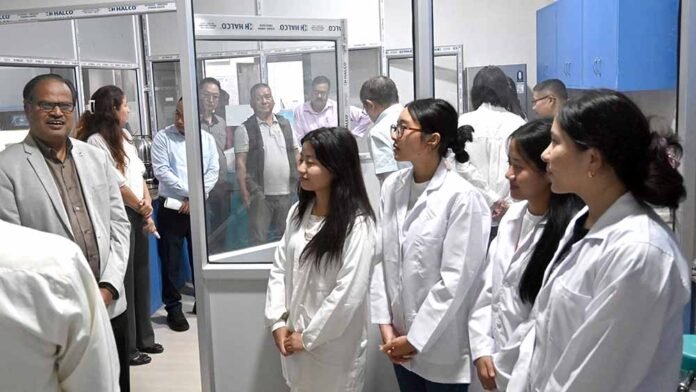An inaugural ceremony followed by one-day workshop on Cancer Research Laboratory was held on October 23, at Department of Zoology, Nagaland University, Lumami, marking a significant milestone in the University’s scientific advancement and commitment to addressing the growing burden of cancer in the region.
A press release by PRO, NU stated that the ceremony was graced by Vice-Chancellor, NU, Prof. Jagadish Kumar Patnaik, as chief guest, and Registrar, NU, Dr. Abemo, as guest of honour.
Prof. Patnaik, in his address, shared personal reflections on how cancer had profoundly affected his own family, having lost close relatives to the disease. He reaffirmed his dedication to advancing scientific research and innovation at the University, urging faculty and students to pursue excellence through research and publication. He also encouraged scholars to document and explore traditional healing practices by engaging with kobiraz (local healers) to identify potential natural remedies, suggesting the possibility of recognizing and patenting such indigenous knowledge.
In his address, Dr. Abemo thanked God for successful launch of the Cancer Research Lab and commended Vice-Chancellor’s vision for fostering scientific innovation within the University.
With a light-hearted remark referencing evolution of science, he underscored the importance of scientific progress for betterment of humanity. He also encouraged collaborative efforts between department and healthcare facilities to work toward a cancer-free society, noting that Nagaland University holds immense potential in contributing to cancer prevention and cure.
In his address, Prof. Ranjit Kumar highlighted the Indian Council of Medical Research (ICMR) data showing Nagaland ranking first in nasopharyngeal cancer and second in oral cancer in India, with notable incidences of oesophageal and colon cancers.
He pointed out that the actual burden may be even higher, as many cases go unreported.
Encouraging students to pursue research in this field, he emphasized that cancer research must be indigenous and locally driven, and noted that the new laboratory would facilitate cancer cell line studies and development of potential therapeutic formulations using resources available within the department, including its animal house.
Delivering the welcome address, Prof. Bendang Ao emphasized the urgent need to focus on cancer research due to alarming increase in cancer cases in the state, particularly gastrointestinal cancers. Drawing from personal experience, he spoke about deep impact of the disease on families and communities.
He also lauded efforts of Prof. Ranjit Kumar for conceptualizing the idea of the Cancer Research Lab and expressed gratitude to the University administration and engineering team for their unwavering support.
NU inaugurates Cancer Research Lab
DIMAPUR

